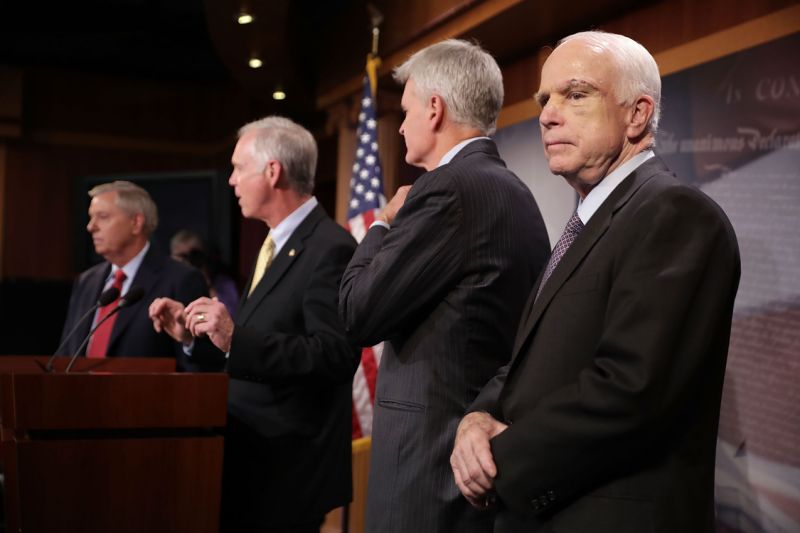McCain: “I believe we could do better working together, Republicans and Democrats”
Developments on Day 246 of the Trump Administration:
See also Podcast: The Russia Investigation Closes on Trump
Podcast: The Russia Investigation Closes on Trump
McCain’s Decision Puts GOP Healthcare Bill on Verge of Defeat
Senator John McCain of Arizona announces that he will not support the GOP’s fourth and possibly final attempt before a September 30 deadline to repeal and replace ObamaCare.
McCain’s decision puts the Graham-Cassidy bill on the verge of defeat. Republicans have only a 52-48 majority in the Senate, and Rand Paul of Kentucky has already said he will vote No. Several other GOP senators, notably Susan Collins of Maine, are said to be on the verge of opposition.
Collins said on Friday that she was “leaning against” the proposal.
Republicans have until the end of September to use special budget rules allowing passage of a repeal bill with a simple majority, rather than 60 votes.
In July, McCain’s statement from the Senate floor — made after his dramatic return from treatment for brain cancer — doomed the third attempt by the GOP’s leadership to push through the repeal.
Yesterday McCain said he could not “in good conscience” support the proposal, sponsored by his close friend Senator Lindsay Graham of South Carolina and by Senator Bill Cassidy of Louisiana:
I believe we could do better working together, Republicans and Democrats, and have not yet really tried. Nor could I support it without knowing how much it will cost, how it will affect insurance premiums, and how many people will be helped or hurt by it.
I cannot in good conscience vote for Graham-Cassidy. A bill impacting so many lives deserves a bipartisan approach. https://t.co/2sDjhw6Era pic.twitter.com/30OWezQpLg
— John McCain (@SenJohnMcCain) September 22, 2017
After July’s failure, Graham and Cassidy led the effort for revised GOP legislation that would pass much of the burden of healthcare provision to states. However, the rush to adopt the initiative has meant that — like predecessors — it has not undergone the scrutiny of public hearings. This time, the Republican leadership has also balked at a score by the Congressional Budget Office, which assessed earlier bills would strip coverage from 26 million Americans and provision for others would be sharply reduced as premiums rose.
With the CBO blocked from a judgement, an Avalere Health analysis found Graham-Cassidy would cut federal money by $215 billion over the next decade, with 34 of 50 states enduring cuts. Medical organizations, including the American Medical Association, and all 50 officials overseeing Medicaid provision at state level warned of serious consequences for many Americans if the bill passes. They noted that Graham-Cassidy does not cover care for pre-existing conditions, despite Donald Trump’s disinformation to the contrary.
Before McCain’s announcement on Friday, Trump had taken aim at Rand Paul and tried to pressure other Senators not to follow him:
Rand Paul, or whoever votes against Hcare Bill, will forever (future political campaigns) be known as “the Republican who saved ObamaCare.”
— Donald J. Trump (@realDonaldTrump) September 22, 2017
Trump Administration to Introduce Revised “Muslim Ban” As Soon As Sunday
Frustrated by courts from introducing a full version of its “Muslim Ban”, the Trump Administration will introduce a revised version as soon as Sunday.
To get around court objections to the ban on citizens of six mainly-Muslim countries from entering the US, the Administration will frame it as a sanction on visitors from areas that do too little to prevent movement of terrorists and criminals.
President Trump is replacing his ban on travelers from six majority-Muslim countries with severe restrictions on visitors from nations he has determined do too little to protect against terrorists and criminals coming into the United States, officials said on Friday.
Official said the restrictions could include indefinite bans on entry until there is a finding of satisfactory vetting procedures. They would not say if the list will include the six countries from which travel was banned by a revised executive order in March: Iran, Libya, Somalia, Sudan, Syria, and Yemen.
The administriation’s 90-day policy review, part of the ban, expires on Sunday. Donald Trump hinted last week that he would be looking for a stringent, long-term ban:
The travel ban into the United States should be far larger, tougher and more specific-but stupidly, that would not be politically correct!
— Donald J. Trump (@realDonaldTrump) September 15, 2017
In July, the Supreme Court allowed the temporary exclusion of entrants from the six countries unless they had a “bona fide relationship” with someone already in the US. In just over two weeks, the court is scheduled to hear arguments in the case over the ban’s constitutionality.
“We need to know who is coming into our country. We should be able to validate their identities,” Miles Taylor, the counselor to the Secretary of Homeland Security, asserted.
He said the new restrictions represent a significant increase in toughening “national security standards and protecting the homeland.”
But Anthony Romero, executive director of the American Civil Liberties Union, was sceptical: “While it has been clear that a neutral vetting system across the board needs to be looked at on its merits, this seems to be a third rescue of the failed Muslim ban.”

